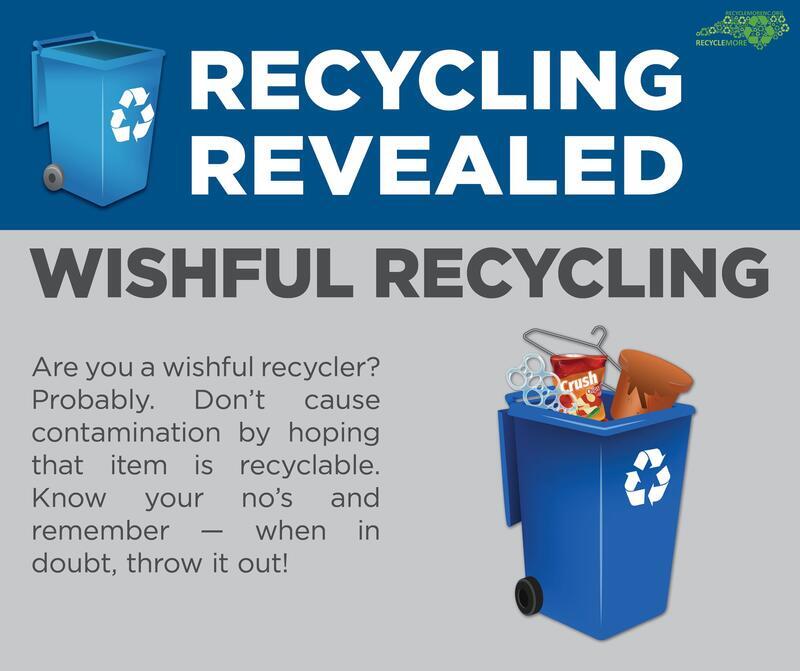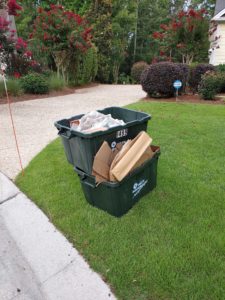It’s Easy to Flunk Recycling
go.ncsu.edu/readext?712720
en Español / em Português
El inglés es el idioma de control de esta página. En la medida en que haya algún conflicto entre la traducción al inglés y la traducción, el inglés prevalece.
Al hacer clic en el enlace de traducción se activa un servicio de traducción gratuito para convertir la página al español. Al igual que con cualquier traducción por Internet, la conversión no es sensible al contexto y puede que no traduzca el texto en su significado original. NC State Extension no garantiza la exactitud del texto traducido. Por favor, tenga en cuenta que algunas aplicaciones y/o servicios pueden no funcionar como se espera cuando se traducen.
Português
Inglês é o idioma de controle desta página. Na medida que haja algum conflito entre o texto original em Inglês e a tradução, o Inglês prevalece.
Ao clicar no link de tradução, um serviço gratuito de tradução será ativado para converter a página para o Português. Como em qualquer tradução pela internet, a conversão não é sensivel ao contexto e pode não ocorrer a tradução para o significado orginal. O serviço de Extensão da Carolina do Norte (NC State Extension) não garante a exatidão do texto traduzido. Por favor, observe que algumas funções ou serviços podem não funcionar como esperado após a tradução.
English
English is the controlling language of this page. To the extent there is any conflict between the English text and the translation, English controls.
Clicking on the translation link activates a free translation service to convert the page to Spanish. As with any Internet translation, the conversion is not context-sensitive and may not translate the text to its original meaning. NC State Extension does not guarantee the accuracy of the translated text. Please note that some applications and/or services may not function as expected when translated.
Collapse ▲We did lots of cleaning and sorting during the recent “stay home” time and we made four big trips to the recycling drop off location. That felt good.
 This got me interested in learning more about recycling here in Brunswick County and I learned a new term…..“wish-cycling”. I bet we’ve all been guilty of doing this at one time or another. It’s when you put something in the recycling bin hoping that it’s acceptable and thinking that if it isn’t someone down- the- road will sort it out.
This got me interested in learning more about recycling here in Brunswick County and I learned a new term…..“wish-cycling”. I bet we’ve all been guilty of doing this at one time or another. It’s when you put something in the recycling bin hoping that it’s acceptable and thinking that if it isn’t someone down- the- road will sort it out.
While it makes you feel like you’ve done the right thing, if you don’t really know if something is accepted here in Brunswick County — don’t “wish-cycle”. This tends to cause more problems, because someone has to physically pick those items out of the piles. In the long run, this ends up costing all of us more. The rule-of-thumb is…if in doubt throw it in the trash.
I reached out to Micki Bozeman the Solid Waste and Recycling Coordinator here in Brunswick County for some answers to specific questions. You can email the Solid Waste operation team with your specific questions to operationservices@brunswickcountync.gov.
Q: Do I need to worry about numbers on plastic? Can I put them all in the recycling bin?
A: You can recycle any bottle, tub, jug, or jar. The best and most obvious are items like water bottles, soda bottles, shampoo, conditioner, mayo, and peanut butter bottles. Plastic or “clamshell” containers that fruit comes in are OK. Yogurt and cottage cheese containers are only accepted in the larger tubs not the small single-use or single-serving containers. They don’t want plastic garbage bags or plastic bags from the grocery store. Numbers are not a true way to tell if something is accepted or not. The only plastics accepted are #1’s and #2’s. However, there are many single-use items with those numbers that are not accepted. No single-use items are accepted—this means no drink cups, no plastic plates, and no plastic eating utensils.
Q: When I recycle a bottle or jar – like a water bottle or a salad dressing jar — should I also include the lid?
A: The lid can be recycled, but it should be screwed back on the bottle or jar. If there was food in the jar wash it out as best as possible. They don’t want those skinny lids like those that come with margarine tubs that pop off.
Q: What about shredded paper, we found a lot of old financial records and shredded them?
A: Shredded paper should be placed in your regular trash. Even if you put it in a paper bag or box. Shredded paper will not be recognized by the sorting machines to be paper. Plus shredded paper will fly off the conveyor belts and go all over the floor and it won’t make it through the sorting system.
Q: Everyone has been doing a lot of take-out. What about pizza boxes, styrofoam boxes, and those aluminum containers?
A: Pizza boxes are accepted as long as there is no grease or food on the cardboard. Some people will remove just the lids and throw the bottom or greasy portion in the trash. Styrofoam is not accepted. Aluminum foil and pans are accepted if they are clean and dry and balled up. This helps the machines recognize it by shape.
The landfill and some special recycling collection convenient sites around the county take recyclable items. In addition to the regular recyclables, year-round they take used cooking oil, used motor oil, oil filters, antifreeze, used fuel, old latex paint, fluorescent bulbs, electronics and computer equipment, household batteries, smoke detectors, automotive batteries, cardboard, and empty propane tanks. Check with the county’s Solid Waste & Recycling Department website to see specific details on these locations and what is accepted. Solid Waste and Recycling
Source: Cheryle Syracuse, Family and Consumer Science staff, N.C. Cooperative Extension, Brunswick County Center




